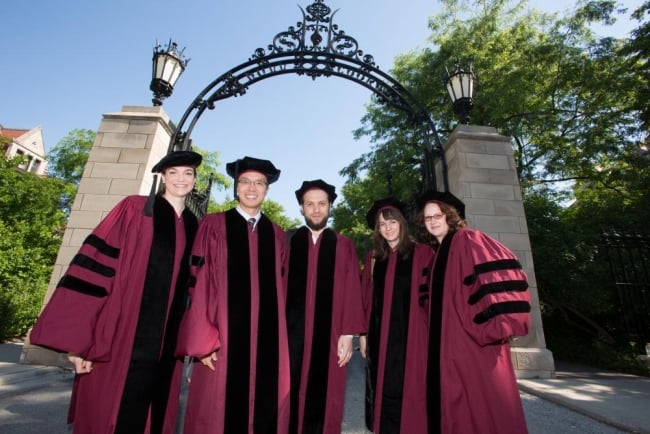You have /5 articles left.
Sign up for a free account or log in.

University of Chicago
While the subject of Ph.D. career outcomes has appeared in numerous articles and studies over the past few decades, an even greater sense of urgency seems to have emerged in recent years, based in part on the downturn of the economy, the recommendations made by the National Institutes of Health Biomedical Workforce Task Force, recent works like the American Historical Association’s Mellon Career Diversity Project, the Ph.D. Placement Project, and myriad others. The National Science Foundation is launching its full-scale data collection phase this fall for the agency’s newly developed instrument, the Early Career Doctorates Survey, and the National Association of Colleges and Employers has assembled a First-Destination Survey Task Force to explore collecting career outcomes data from advanced degree graduates for the first time, having done this previously for undergraduates alone.
Yet in spite of significant time, energy, and resources expended on these efforts and others, there is still no comprehensive, standardized, systematic, affordable method to collect the data that all of these groups seek.
Why does this issue persist? It is due in part to the nature of the data institutions wish to collect. Together with aggregate data, data on career outcomes at the departmental level must also be collected, but cannot be shared easily, as confidentiality would be difficult to ensure for departments with only a few Ph.D.s graduating every year. And for all of the large-scale data collection efforts that have been undertaken, none measure the doctoral population in the U.S. in its entirety. Some focus on single disciplines; others miss scholars who earn Ph.D.s outside of the U.S. but are here for additional training or employment. Still others focus on collecting data longitudinally but may not be able to share it institutionally, and those institutions that collect data longitudinally at the departmental level are often unable to do the same at the postdoc level. The list of challenges is extensive, and unsurprisingly includes a lack of resources, staff time, and access to individuals who have completed doctoral programs.
While I recognize, study, and have given talks at the national level on this issue for years as a university administrator and career counselor for graduate students and postdocs, I have encountered a pronounced lack of interest on the part of senior administrators at institutions where I have worked to undertake the study of career outcomes of Ph.D.s. Consequently, I was pleased to receive an invitation from the Council of Graduate Schools to a workshop held a few weeks ago to explore this topic and consider solutions.
The Council of Graduate Schools (CGS) recently secured funding from the Alfred P. Sloan and Andrew W. Mellon Foundations for a project called Understanding Ph.D. Career Pathways for Program Improvement. Having completed the first and second elements of this project, a survey to graduate school deans and a white paper on the topic, CGS moved on to the third element in the initial research phase by inviting a group of graduate deans, executives from funding agencies, government agencies, and professional societies, Ph.D. labor market experts, and current Ph.D. students to meet in Virginia on the last days of September at a two-day workshop addressing data around Ph.D. career outcomes and considering potential next steps.
The workshop provided the time and space for the stakeholders assembled to consider what is currently known about Ph.D. career outcomes in the U.S., what data are still lacking, who should collect the data, and how it might be used once collected. Answers to these questions are sought by countless communities, including prospective and current graduate students, postdoctoral scholars, faculty, administrators, funding agencies, professional societies, employers, and policymakers, yet resolution remains elusive. Below is a synopsis of how invited attendees approached this problem and coalesced around a singular call for action.
After a brief welcome by the current president of CGS, Suzanne Ortega, executives from the Sloan and Mellon Foundations shared words reaffirming the commitment of their organizations to addressing this critical data gap. The research team appointed to the project then gave an overview of data sources available to date, shared questions to drive the two-day discussion, and provided the framework of the study and ensuing workshop.
Participants then heard from labor market experts on gaps in the research on Ph.D. pathways. Data scientists and specialists described the complexities involved in collecting this data, such as the development of standardized questions, definitions, instruments, and goals. A few scientists, including Jeff Groen of the U.S. Bureau of Labor Statistics and Bruce Weinberg of Ohio State University and the National Bureau of Economic Research, pointed to new strategies in data mining, and the ability to extract data from various sources that are publicly available. Weinberg expressed optimism at the prospect of developing “low-cost, low-burden, comprehensive, high-quality, transparent, research-backed, robust metrics.” Not only did he suggest that building such a system was possible, he added that such a system could also include a user-friendly dashboard at the institutional and/or departmental level. Michael Roach of Cornell University stressed the efficacy of using social media tools to reach Ph.D. alumni for data collection efforts, which he has been undertaking for some time with collaborator Henry Sauermann of Georgia Tech.
Following the data assessment, a panel of graduate deans was charged with sharing their views on the challenges and opportunities that graduate institutions encounter in the collection of Ph.D. career outcomes. The thoughts expressed by the panel highlighted an acute understanding among the deans and vice provosts of the current tenure-track job market, the persisting culture of academe and its all-or-nothing philosophy around career outcomes, and the impact of both the market and the culture on the graduate students, postdocs, and alumni who have been through it.
Hearing a panel of senior leaders from some of the most prestigious institutions in the world express their unconditional support for a unified effort to collect Ph.D. careers data evoked intense feelings of vindication, as I and others have long since championed this idea before university administrators and have been met with inaction or outright veto, seldom with success, and never with majority support. Indeed, several deans on the panel mentioned the transformative effect such data could have on graduate and postdoctoral training programs across the country, and the profound impact the data could have for Ph.D.s on a personal level. Lisa Tedesco, dean of the James T. Laney School of Graduate Studies at Emory University, recounted an exchange with a graduate student who experienced a “persistent shame of inadequacy” when confronted by faculty attitudes about jobs outside of the tenure track. In fact, if faculty at this institution understood the actual employment patterns of Ph.D.s, perhaps the persisting culture of condescension around Ph.D.s entering different occupations would begin to erode.
The first day of the workshop concluded with a panel of recent Ph.D. graduates and current Ph.D. candidates. While several disciplines were represented on the panel, the participants spoke with one voice about the urgent need for more and current data on career options, a message I have heard from the Ph.D. population continually, and indeed the most compelling reason I have embarked on a book-length research project to illustrate Ph.D. employment outcomes in the social, physical, and life sciences and engineering.
The second day opened with a lively discussion about pathways by disciplinary group, with the humanities and social sciences being considered in one room and science, technology, engineering, and mathematics in another. Each group was assigned to generate a list of challenges and opportunities in gathering Ph.D. careers data, using or reporting the data, and for identifying any omissions from previous discussions. In spite of the disciplinary split, common themes arose in both sessions. Critical issues outlined included: securing funding for a project of this scope; finding a logical home for the project to ensure sustainability; constructing a sufficiently flexible system design that would allow institutions to tailor the data collected according to their needs; protecting the data gathered; standardizing the instrument, collection method, policies, and procedures around the data; and safeguarding all participants, most notably the Ph.D.s, postdocs, and alumni themselves.
In closing the workshop, Steve Matson of the University of North Carolina at Chapel Hill and his colleague, Jeannine Blackwell of the University of Kentucky, listed a few potential next steps for such a project: prioritization of goals and objectives; identification of data elements; integration of existing resources and data sets; and securing funding for the project.
Conversations that took place over the course of these two days in Virginia suggest that, at least as evidenced by this sample, there is widespread, compelling support from institutions, funders, professional associations, employers, policymakers, and Ph.D.s themselves for a large-scale, data collection initiative on Ph.D. career pathways.
The Council of Graduate Schools seems uniquely poised at this moment to take a leadership role by developing a system to collect comprehensive data on Ph.D. career pathways. Given the overwhelming support that I observed, I am hopeful that CGS will initiate action around this endeavor. Yet while the September workshop was undoubtedly worthwhile, and energizing to many, the need for Ph.D. career transparency remains undeniable — and unresolved.








